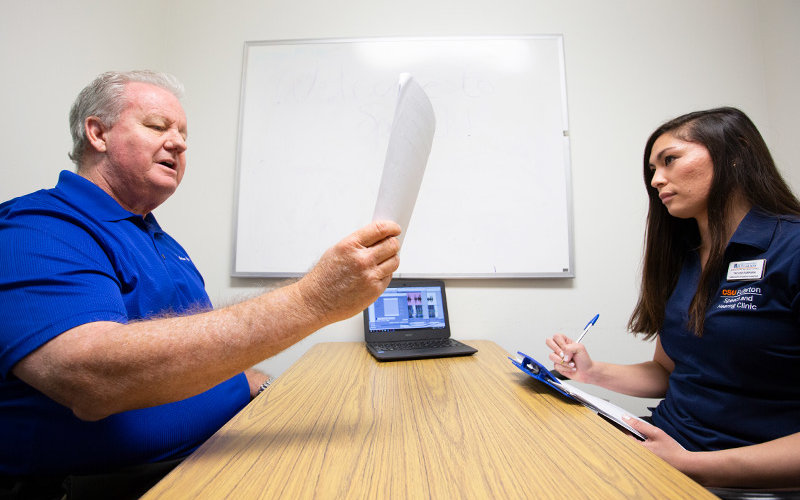
Tim Brundige found his voice at Cal State Fullerton. His big, booming voice.
Education often gives its students a voice, a new confidence, even a stage or a chance at the microphone. But for Brundige, finding his voice was like a homecoming, a chance to return to the mic as a high school sports announcer of 28 years and an event emcee of nearly 20 years. It was the student clinicians at Cal State Fullerton’s Speech and Hearing Clinic who helped Brundige retrain his voice, so he could sound like himself again.
“I’ve got a good thing going and I want to keep it going,” said Brundige, 63, of Fullerton. “I’ve gotta get to 30 years.”
A surgery to replace discs in his neck and spine damaged his vocal chords and altered his ability to work a sales job and his side job announcing sports games at Servite High School. When longtime fans asked if he had a cold or asked what was wrong, it hurt, said Brundige.
“My voice was my money-maker,” he said. “I was desperate to do something to get my self-confidence back.”
Brundige took the advice of friends who recommended he reach out to Cal State Fullerton’s Speech and Hearing Clinic, where graduate students learn to be future speech-language and hearing professionals in a campus-based clinic for community clients. The students who work in the clinic, leave the campus as clinic-savvy and workforce-ready leaders, said HyeKyeung Seung, chair and professor of communication sciences and disorders.
Steadily, over two years, Brundige’s strained whisper has returned to the attention-grabbing deep tones that made him feel more like himself on business calls and in the press box at the stadium or gymnasium.
Taylor Purpura, a graduate student who is studying to become a speech and language pathologist, leads him in weekly breathing and vocal exercises designed to train his vocal folds to come together when attempting higher- and lower-scale sounds.
“I’m seeing progress at each session. It’s been miraculous in my mind,” he said. “I’m amazed at the confidence and talent the students have as clinicians. They’re all very talented, and very tough,” he said with a laugh.
Purpura, 22, of Anaheim Hills, said she’s gaining experience with Brundige and other clients that will help her stand out in a competitive field.
“This is amazing to be able to jump right into it and apply what I’ve learned to my therapy,” she said. “It makes me feel really good that I can help him reach his goals.”
The clinic on the first floor of the College Park building educates and trains Titans with the knowledge, skills and clinical experience to become certified and licensed speech language pathologists. The students assist clients of all ages in its adult clinic, child clinic, multicultural clinic and summer speech camp for children.
In January 2018, the clinic shifted to a voluntary donation or non-fee system for clients and community members. The move allows the clinic to broaden its reach into the community while making the services accessible to everyone.
The clinic also provides speech therapy for pediatric speech and language impairments, stuttering, adults with aphasia due to stroke, Parkinson’s disease and traumatic brain injuries. Clients include community members, like Brundige, as well as current CSUF students who stutter and are seeking careers that require frequent interactions and presentations, said Phil Weir-Mayta, the clinic’s director and assistant professor of communication sciences and disorders.
More than a dozen students work in the labs run by Weir-Mayta. They have given talks and presented at both state and national conferences about their work, he said. Nursing and speech-pathology students also work together to build interprofessional communication skills through the use of simulated patient scenarios.
In the fall, Kenneth Tom, professor emeritus of human communication studies, and alumna Michelle Gordon, a speech pathologist, launched a transgender voice and communications clinic for gender identity and gender expression and clients who are transitioning. Three graduate students attended workshops before they began seeing clients at the clinic as part of a clinical practicum in the university’s new practicum course on the transgender voice communication.
The CSUF Speech and Hearing Clinic is open for potential new client walk-ins and calls during the fall, spring and summer semesters, Monday through Thursday, 10 a.m. to 4 p.m.